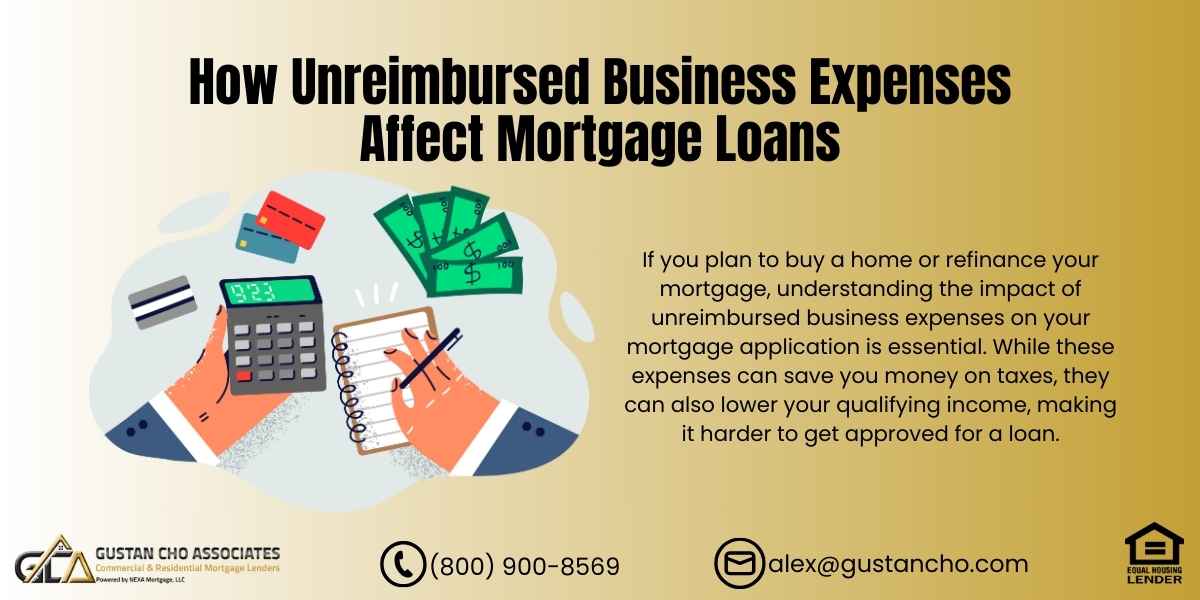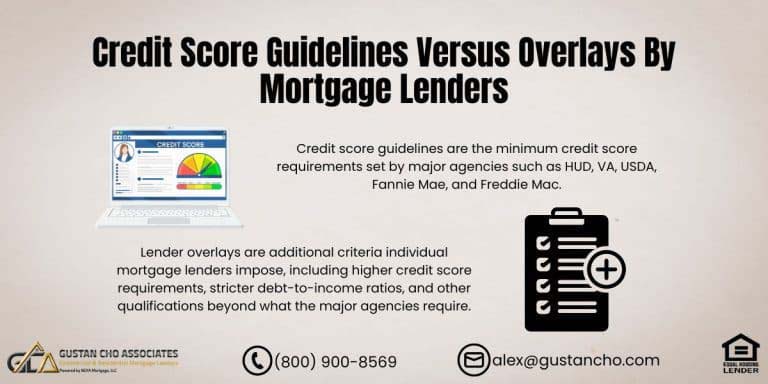How Unreimbursed Business Expenses Affect Your Ability to Get a Mortgage in 2024
If you plan to buy a home or refinance your mortgage, understanding the impact of unreimbursed business expenses on your mortgage application is essential. While these expenses can save you money on taxes, they can also lower your qualifying income, making it harder to get approved for a loan.
In this blog, we’ll break down unreimbursed business expenses, how they affect your mortgage eligibility, and what loan options might work best for you in 2024.
What Are Unreimbursed Business Expenses?
Unreimbursed business expenses are costs you incur for work-related purposes that your employer doesn’t reimburse you for. These can include:
- Tools and equipment for your job
- Mileage and travel costs
- Uniforms and work attire
- Continuing education and certification expenses
For self-employed individuals, these expenses are often deducted from your tax return to lower your taxable income. However, this deduction can also reduce your “qualifying income” when applying for a mortgage, affecting how much you can borrow.
IRS Form 2106 and the 2017 Tax Changes
Before 2018, unreimbursed business expenses were reported on IRS Form 2106 and could be deducted by many employees. However, the Tax Cuts and Jobs Act (TCJA) eliminated this deduction for most W-2 employees starting in 2018.
Only specific categories of workers—like military reservists, performing artists, and state or local government officials—can claim these deductions. Self-employed individuals and independent contractors can still write off these expenses, but the deductions will directly reduce their qualifying income for a mortgage.
How Do Unreimbursed Business Expenses Affect Mortgage Qualification?
When mortgage lenders assess your qualifying income, they begin with your gross income and deduct any unreimbursed business expenses. This adjustment can greatly influence your overall eligibility, particularly if you are self-employed or depend on 1099 income. It’s important to understand these factors to navigate your mortgage options better.
For example:
- You earn $120,000 per year ($10,000 per month).
- You report $24,000 in unreimbursed business expenses on your tax return.
- Your adjusted monthly income for mortgage purposes is $8,000, not $10,000.
This lower qualifying income means you’ll qualify for a smaller loan or might not meet the debt-to-income (DTI) ratio requirements for the home you want to buy.
Start Your Process Towards Buying A Home
Apply Online And Get recommendations From Loan Experts
Types of Borrowers Most Affected by Unreimbursed Business Expenses
Certain types of borrowers are more likely to be affected by unreimbursed business expenses:
- Self-Employed Borrowers:
- Self-employed individuals often deduct significant business expenses to lower their taxable income, which can hurt their mortgage eligibility.
- 1099 Contractors:
- Independent contractors and gig workers report income and expenses on their tax returns, and any deductions reduce their qualifying income.
- W-2 Employees in Specific Jobs:
- Workers in jobs requiring substantial out-of-pocket costs (e.g., traveling salespeople or tradespeople) may also see their qualifying income reduced if they’re eligible to deduct these expenses.
Loan Options That Minimize the Impact of Unreimbursed Business Expenses
The good news is that there are mortgage programs designed to help borrowers whose qualifying income is affected by unreimbursed business expenses. Here are some options available in 2024:
- W-2 Income-Only Mortgage Loans:
- These loans allow W-2 employees to qualify using only their W-2 income without requiring tax returns.
- Perfect for borrowers with unreimbursed expenses that would otherwise reduce their income.
- Bank Statement Loans:
- Designed for self-employed borrowers, these loans calculate income based on bank deposits rather than tax returns.
- Unreimbursed business expenses don’t factor into the income calculation, making qualifying easier.
- No-Doc Loans:
- These non-QM loans don’t require income verification or tax returns. Borrowers can qualify based on credit score, down payment, and property value.
- DSCR Loans (Debt-Service Coverage Ratio Loans):
- Ideal for real estate investors, these loans focus on the property’s rental income rather than the borrower’s personal income.
- Unreimbursed business expenses have no impact on qualification.
- Stated-Income Loans:
- These loans allow borrowers to state their income without full documentation as long as they meet other requirements like a substantial down payment.
How Mortgage Underwriters Analyze Unreimbursed Business Expenses
When reviewing your application, mortgage underwriters will carefully examine your tax returns (if required) to determine the impact of unreimbursed business expenses on your income. Here’s how the process works:
- Review of IRS Form 2106:
- If you’re eligible to deduct unreimbursed business expenses, the underwriter will average these expenses over the past 24 months.
- One-Time Exceptions:
- Suppose the expenses were a one-time occurrence (e.g., you purchased expensive equipment for a new job). In that case, you may be able to exclude them with proper documentation and a letter of explanation.
- Declining Income:
- If your income has declined over the past two years, underwriters may require a detailed explanation. They’ll look for trends and may average your income over two years to account for fluctuations.
Get Qualify For Mortgage With Low Credit Scores
Apply Online And Get recommendations From Loan Experts
Case Scenario: Carpenter with Unreimbursed Expenses
Let’s look at a real-life example to understand the impact of unreimbursed business expenses:
- Profession: Carpenter
- Annual Income: $80,000
- Unreimbursed Expenses: $15,000 (tools, equipment, travel)
The carpenter’s adjusted annual Income for mortgage qualification is $65,000. This reduction affects their DTI ratio, lowering their borrowing capacity. However, by opting for a W-2 Income-Only Loan, they could qualify based on gross Income without considering these expenses.
Tips for Borrowers with Unreimbursed Business Expenses
If you’re worried about how unreimbursed business expenses might affect your mortgage application, here are some tips to maximize your chances of approval:
- Organize Your Finances:
- It’s essential to maintain accurate records of income and expenses. Doing so will help you gain a clearer understanding of your financial situation, which can assist you in making informed decisions.
- Work with a tax professional to ensure your deductions are accurate and necessary.
- Choose the Right Loan Program:
- Explore non-QM loans, bank statement loans, or W-2 income-only loans to minimize the impact of tax deductions.
- Provide Documentation:
- Be prepared to explain any significant expenses or fluctuations in income.
- Submit letters of explanation and supporting documents to underwriters.
- Improve Your DTI Ratio:
- Focus on reducing debt to enhance your financial standing. This strategy can significantly boost your debt-to-income ratio, effectively compensating for your lower qualifying income.
- Work with a Specialized Lender:
Consider partnering with a lender such as Gustan Cho Associates, known for its expertise in managing intricate financial circumstances. They provide diverse loan options tailored to various needs, ensuring borrowers find the solutions that best fit their situations.
Why Choose Gustan Cho Associates for Your Mortgage Needs?
At Gustan Cho Associates, we specialize in helping borrowers with unique financial situations, including those affected by unreimbursed business expenses. Here’s what sets us apart:
- No Lender Overlays: We offer government and conventional loans without additional restrictions.
- Non-QM Loan Options: We provide flexible solutions for everything from bank statement loans to no-doc mortgages.
- Expert Guidance: Our dedicated team is here for you every day of the week, ready to answer your questions and support you in confidently navigating the mortgage process.
Final Thoughts
Understanding how unreimbursed business expenses affect your mortgage application is crucial in today’s lending environment. While these expenses can lower your taxable income, they don’t have to prevent you from achieving your homeownership goals. With the right loan program and a knowledgeable lender, you can navigate these challenges and secure the financing you need.
Ready to explore your options? Contact Gustan Cho Associates today at 800-900-8569 or email us at gcho@gustancho.com. Let’s make your dream home a reality!
Frequently Asked Questions About Unreimbursed Business Expenses:
Q: What are Unreimbursed Business Expenses?
A: Unreimbursed business expenses are costs you pay out of pocket for your job, like tools, travel, uniforms, or training, that your employer doesn’t pay you back for.
Q: Do Unreimbursed Business Expenses Affect My Ability to Get a Mortgage?
A: Yes, they can. Reporting unreimbursed business expenses on your tax return reduces your qualifying income, which can make it harder to get approved for a mortgage.
Q: Can W-2 Employees Still Deduct Unreimbursed Business Expenses?
A: Many W-2 employees cannot deduct these expenses because of the 2017 Tax Cuts and Jobs Act. However, certain individuals, such as military reservists and performing artists, might still qualify for these deductions. It’s important to explore your specific situation to determine eligibility.
Q: How do Unreimbursed Business Expenses Affect Self-Employed Borrowers?
A: Self-employed borrowers who deduct business expenses on their tax returns will have a lower qualifying income for mortgage purposes, which may limit the loan amount they can get.
Q: Are There Mortgage Options That Don’t Consider Unreimbursed Business Expenses?
A: Yes, programs like W-2 Income-Only Loans, bank statement loans, no-doc loans, and DSCR loans don’t require tax returns, so unreimbursed expenses won’t affect qualification.
Q: What Happens if I have Unreimbursed Expenses for Only One Year?
A: If the expenses are a one-time occurrence, you can provide documentation and a letter of explanation to exclude them from your qualifying income.
Q: How do Underwriters Calculate Income with Unreimbursed Business Expenses?
A: Underwriters will look at your tax returns and average unreimbursed expenses over 24 months, subtracting that amount from your gross income to determine your qualifying income.
What Loan Options are Available for Borrowers with Unreimbursed Business Expenses?
A: You can explore W-2 Income-Only Loans, bank statement loans, and non-QM loans, which don’t penalize you for unreimbursed expenses.
Q: Can Unreimbursed Business Expenses Affect my Debt-to-Income (DTI) Ratio?
A: Yes, because these expenses reduce your qualifying income, they can raise your DTI ratio, making it harder to qualify for a mortgage.
Q: How Can I Improve my Mortgage Chances if I have Unreimbursed Business Expenses?
A: You can organize your finances, reduce debt, provide detailed explanations for one-time expenses, and work with a lender like Gustan Cho Associates, specializing in unique financial situations.
Related> Amending tax returns to qualify for a mortgage
Related> Factors that affect pre-approval
This blog about “How Unreimbursed Business Expenses Affect Mortgage Loans” was updated on December 10th, 2024.











Home buyers who have a lot of unreimbursed business expenses on their income tax returns can potentially qualify for W2 INCOME ONLY MORTGAGE LOANS where income tax returns are not required.